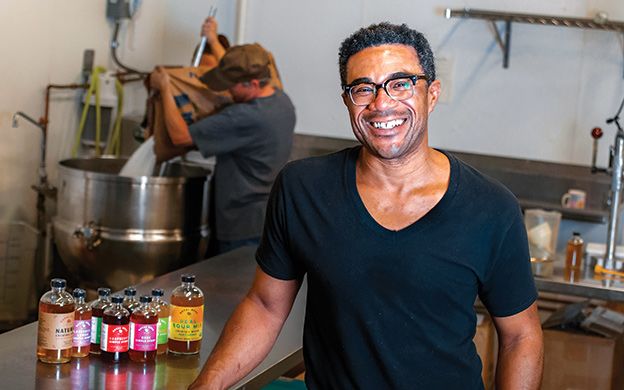Processing Your Payment
Please do not leave this page until complete. This can take a few moments.
It's all about making local connections in Maine's beverage industry
Turning passion into profits is never easy. It's particularly challenging in the rapidly expanding and fiercely competitive beverage industry.
Three companies with Maine ties and multi-state operations are focusing not just on the bottom line, but also on ingredients and processes in a highly competitive industry. Costs are higher, making the balance more complicated.
Royal Rose Simple Syrup, Bluet and Maine Root are growing brands, all at different phases of their growth, but they share common threads. In the words of Maine Root's president Mark Seiler, the equation is actually pretty simple:
“You attract customers with a good product at a price you can afford to make it for,” he says.
Royal Rose's move to Maine
Forrest and Emily Butler started Royal Rose in their kitchen in Brooklyn, N.Y., in 2010, with no initial intention of manufacturing the premium mixers. Emily had been canning peaches and they thought the leftover juice, along with fresh basil and spices, might make an interesting 'simple syrup' to mix into a cocktail. She was a teacher; Forrest, thanks to the recession, was an interior architect-turned-bartender. He took a jar of their syrup to work that evening and after customers raved about his fruit-infused cocktails, the couple made more, lots more.
One of its challenges has been to educate not only consumers but supermarket chains. Royal Rose sells syrups in a variety of flavors — Strawberry Fennel, Lavender Lemon, Raspberry and Ginger Lime. They add flavor to cocktails, but also water, seltzer, soft drinks, teas, even wines and beers. They can be stirred into coffee, poured over yogurt or ice cream and added to desserts. Its syrups sell for about $12 for an eight-ounce bottle.
“We started at a time when this type of mixer wasn't even a thing yet,” Forrest says. “So a lot of retailers didn't get it; didn't know what to do with us. Now larger chain stores are reaching out — people who told us 'no' three or four years ago. Interest is starting to explode.”
Sales have increased an average of 65% annually over the past six years.
“This has been a bootstrapped operation from Day 1,” Forrest says.
To launch the company, they maxed out their credit cards.
“It was really tough, but we didn't want to take on investors, we wanted to grow it organically,” he says.
Perseverance, a favorable review and word-of-mouth recommendations gave the company early momentum. Local bars and restaurants were early adopters. Their first big order, from retailer Williams-Sonoma, was sparked by a review on a popular blog.
“But the logistics and financials of running a food company in Brooklyn were just untenable,” Forrest says, so in 2012 they headed north.
Today, Royal Rose is based in 2,100 square feet in the Fort Andross Mill in Brunswick.
“In terms of logistics and overhead costs, it's been really beneficial to be in Maine. And working with the food lab at [the University of Maine at Orono] has been so much easier and less expensive,” Forrest says. “We love this space we found and we love Brunswick.”
Williams-Sonoma is still a customer, the company's largest, as is Whole Foods Market. Royal Rose products are sold in 30 states, Canada and Australia. Roughly 60% of sales are through distributors, 32% direct to retailers, restaurants and bars. About 7% is from online purchases. Accounts in Maine contribute about 5% of overall sales.
“One thing we lost when we left New York is the local support,” Forrest says. “We have maybe 10 really great local relationships here with buyers; in Brooklyn we had 60. Maine is such a small market that it can be difficult to build relationships in your industry. There is enthusiasm here, but the population is small.”
Managing distributors is vital to maintaining margins
The Butlers use nine distributors. Forrest stressed that establishing productive relationships with distributors can be rough for start-ups.
“You have to account for growth and scale in your pricing; distributors want discounts and incentives. We built in the cost per unit of working with them, right in the beginning,” Forrest says. “Distributors aren't necessarily trying to promote your brand. You've got to show them how to make money with your product. A good distributor does two things well: they pay their bills on time and they keep your product stocked. But you've still got to sell it.”
That means the Butlers are promoting the products at events, demos and tastings.
“You can only do so much over the phone and with email. You have to do it face-to-face to build relationships and trust,” Forrest says. “You can make the best product in the world, but you gotta go out and sell it, or you don't have anything. You've got to support it and help the stores get it off the shelves. Creating consumer awareness and demand is very, very hard. We really need $150,000 to $200,000 for more marketing.”
The Butlers see the potential to grow distribution in California, Asia and Europe. They are beginning to look for a strategic equity partner — with, Forrest adds, “funds and connections.”
Sparkling wine from Maine wild blueberries
Another Maine-based startup, Jefferson-based Bluet, makes sparkling wine from wild blueberries. The product, which sells for around $22 a bottle, is distributed through Portland-based Crush Distributors.
Partners Eric Martin and Michael Terrien, an experienced vintner who produces Terrien wines in California, just barreled their 2016 vintage, which they anticipate will be their best since they started Bluet in 2012, partly because they're tweaking the process, but also because Maine's hot dry summer created an intensely flavored crop of berries.
The first vintage they bottled for commercial release, 2014, sold out 500 bottles in a month. The 2015 vintage, 2,000 bottles, also sold out within a few months.
Boyhood friends in Cape Elizabeth, both partners now live out of state, working remotely with frequent visits.
Bluet is made with only a small amount of sugar to feed the yeast. The wine's bubbles come from the natural fermentation process. It's 100% wild Maine blueberries. It has a natural acidity and the wine is similar to white wine, Terrien says.
At a time when the USDA is buying up surplus Maine blueberries, “Bluet might be the highest added value product of all for Maine wild blueberries,” Terrien says. “We're using three pounds per bottle.”
The Wild Blueberry Association of North America has embarked on a public relations effort to increase consumption.
“There's a huge potential market, and Bluet could become part of the Maine experience of summer — lobsters and blueberry wine,” Terrien says.
Terrien expects to do 4,000 bottles from this summer's crush. Bluet aims to produce 2,000 cases (12 bottles per case) by 2020, which he estimates would require $125,000 in capital to add equipment, at least one employee and more functional space. Funding to date, close to $100,000, has come from the partners' wallets.
“Our costs are huge now, but they'll go down over time,” Terrien says. “On a unit basis, we're profitable now, but all profits are going back into growing the business.”
They bought used equipment from Terrien's vintner colleagues and his wife, Hannah Henry, a senior web designer with Old Navy, built their website and manages their marketing. For now, they're using the basement of a bed-and-breakfast in Jefferson.
“It's a low-ceilinged space with one entryway. We can't back a truck in there,” he says. “We have to hand carry everything out, which is not going to work as we expand.”
Bluet is one of the 26 participants chosen for this coming season's “Greenlight Maine” television program, which will award a $200,000 grand prize.
“We've been exploring federal, state, and local dollars, through the USDA's [Local Food Promotion Program] and we've met with CEI,” Terrien says. “We've been surprised to see how much money is available to help small companies get started in Maine.”
Maine Root shows the way
Soft drink manufacturing is nothing like the descriptor implies — it's hard and intensely competitive, says Mark Seiler, president of Maine Root, whose eight bottled sodas and three lemonades are distributed through five warehouses around the country. Maine Root's market includes North America, Europe, Dubai and Hong Kong. Its fountain drinks, which are produced in Texas, are sold in thousands of restaurants. The company is privately held and does not disclose its revenue or even how many employees it has.
“The soft drink world is a very damn competitive market. Everybody wants to know how you're doing what you're doing,” Seiler says. “We don't want any investors. It's a private company owned by [my brother] Matt and myself and our goal is to keep it that way, and pass it down to our kiddos.”
Its largest customer is Whole Foods. As sales of conventional sodas have struggled, sales of Maine Root are up “double digits over the past few years,” though Seiler won't be any more specific. He is open about the company's philosophy and methodology.
“We are very unconventional as to how we operate and market our products. We don't do any advertising,” he says.
Seiler's operating mantra is fundamentals first, honed during his previous career in software sales.
“You have to understand your costs down to the penny, right from the start, or you're not going to make it,” he says. “The first deal you strike with a distributor or retailer is probably the deal you're going to have to live with. They'll say that the numbers will go up over time. It doesn't happen. If you can't do it at a profitable rate from the start, don't do the deal.”
Right product at the right time
Mark's brother Matt Seiler started making the company's initial product, root beer, when he worked at Portland's Flatbread Co. Stonewall Kitchen's cafe in York and Lois' Natural Marketplace were early customers.
“Whole Foods and Hannaford jumped on board pretty quickly,” Seiler says. “We started this at a real growth time in the industry for organic and 'natural' products. The barriers to entry now are much higher.”
Fair Trade Certified organic sugar is the drink's primary ingredient, and at the core of the company's mission. It contributes not only to the taste, but to the health and safety of the farmers in Paraguay from whom it's sourced. Maine Root has farmers growing 1,000 acres of sugar cane, sustainably and hand-cut.
“It's the finest, purest sugar there is, and we pay a 10% premium for it,” Mark Seiler explains.
The certification also guarantees more humane working conditions. He does wonder sometimes if going it alone, with no investors, makes it harder than it has to be.
“If I had this to do over again, it would be a real soul-searching experience for me,” Seiler says. “Would I do it this way again, or would I take the money and hire a huge staff and hope for a big buyout at some point? That's the way a lot of people do it, but for a lot of them that big buyout doesn't come, and instead, the investors kick them out on their asses after five years.”
















Comments